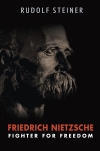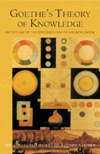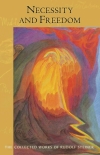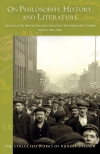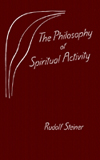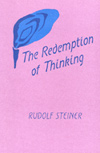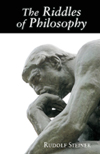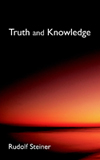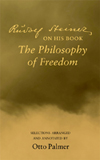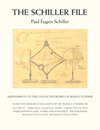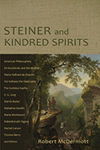
- RUDOLF STEINER
- OTHER AUTHORS
-
PHILOSOPHYRUDOLF STEINER
Fighter for Freedom
Translated by Margaret Ingram deRis
Immediately upon reading Nietzsche’s Beyond Good and Evil in 1889, Rudolf Steiner recognized a kindred spirit—a courageous fighter for the freedom of the human individuality who waged a fierce but unconscious battle against the unspiritual views of the age.
An Outline of the Epistemology of His Worldview
As the editor of Goethe's scientific writings during the 1880s, Rudolf Steiner became immersed in a worldview that paralleled and amplified his own views in relation to epistemology, the interface between science and philosophy, the theory of how we know the world and ourselves. At the time, like much of the thinking today and the foundation of modern natural science, the predominant theories held that individual knowledge is limited to thinking that reflects objective, sensory perception. Steiner's view was eventually distilled in his Anthroposophical Leading Thoughts in 1924.
Translated by Pauline Wehrle
Abounding in lively anecdotes and fresh insights, these lectures draw the reader into a rich contemplation on the nature of necessity and freedom in the world and in human life. A master of the art of the lecture, Rudolf Steiner brings together apparently disparate elements, resolving contradictions into a higher unity, showing us that far from being mutually exclusive, necessity and freedom are intimately interwoven in the intricate tapestry of life.
ON PHILOSOPHY, HISTORY, AND LITERATURE
Lectures at the Worker Education School and the Independent College, Berlin, 1901–1905
Steiner’s approach was at first a surprise for the students, who had been schooled in Marxist thought and tended to view all spiritual matters as ‘byproducts’ of material, economic processes. For them, it was questionable whether the spiritual striving of individual human beings could really be a driving force in history. Steiner knew the soul disposition of his students and the ‘inexpressibly tragic situation’ that the proletariat’s intense desire for knowledge had so far been ‘satisfied only through the grossest form of materialism.’ But the materialistic ideas that had been absorbed by the workers from popular scientific literature and from Marxist writings contained ‘partial truths.’ (introduction)
THE PHILOSOPHY OF SPIRITUAL ACTIVITY
Since this book was written more than a century ago, many have tried to discover the kind of new thinking that can help us better understand the spiritual, ecological, social, political, and philosophical issues that face us. Steiner showed a path that leads from ordinary thinking to the level of pure spiritual activity - true inner freedom
A Study in the Philosophy of Thomas Aquinas
Steiner begins these three lectures by depicting the background of early Christian thought, from which scholastic philosophers arose. He focuses on the "unanswered question" of the scholastic movement: How can human thinking be made Christlike and develop toward a vision of the spiritual world?
Presented in an Outline of Its History
This classic volume, unavailable for a long time, is not a history of philosophy in the usual sense of the word. It does not give a history of the philosophical systems, nor does it present a number of philosophical problems historically. Its real concern touches on something deeper - on riddles rather than problems.
Introduction to The Philosophy of Spiritual Activity
This work, essentially Rudolf Steiner's doctoral dissertation, subtitled 'Introduction to the Philosophy of Freedom' is just that - an essential work in the foundations of spiritual science. The epistemological foundations of spiritual knowledge are clearly and logically presented.
-
PHILOSOPHYOTHER AUTHORS
RUDOLF STEINER ON HIS BOOK 'THE PHILOSOPHY OF FREEDOM'
Otto Palmer
Much has been written on The Philosophy of Freedom, but the advantage of discovering what the author himself had to say about this most important and seminal work is obvious. Not only were the words of the text chosen most carefully, but also its very structure was intended to become a powerful inner experience for the careful reader. Otto Palmer has provided an invaluable service by extracting numerous references from the words of Rudolf Steiner, providing keys to the deeper meanings behind the words.
Supplements to the Collected Edition of Rudolf Steiner
Scientific Research Suggested by Rudolf Steiner
Paul-Eugen Schiller
Anthroposophy has manifold roots in natural science. Rudolf Steiner never tired of saying that the development of scientific awareness had given people the possibility of freedom, that the way to cognizing the spiritual world is based on the natural scientific attitude, and that certainty of such knowledge is comparable to the certainty found in mathematics and natural science.
Robert A. McDermott
“Philosophy has to proceed comparatively. The best we can do is to develop the rival alternative conceptions in each important domain as fully and carefully as possible, depending on our antecedent sympathies, and see how they measure up. That is a more credible form of progress than decisive proof or refutation.” —Thomas Nagel, American philosopher


